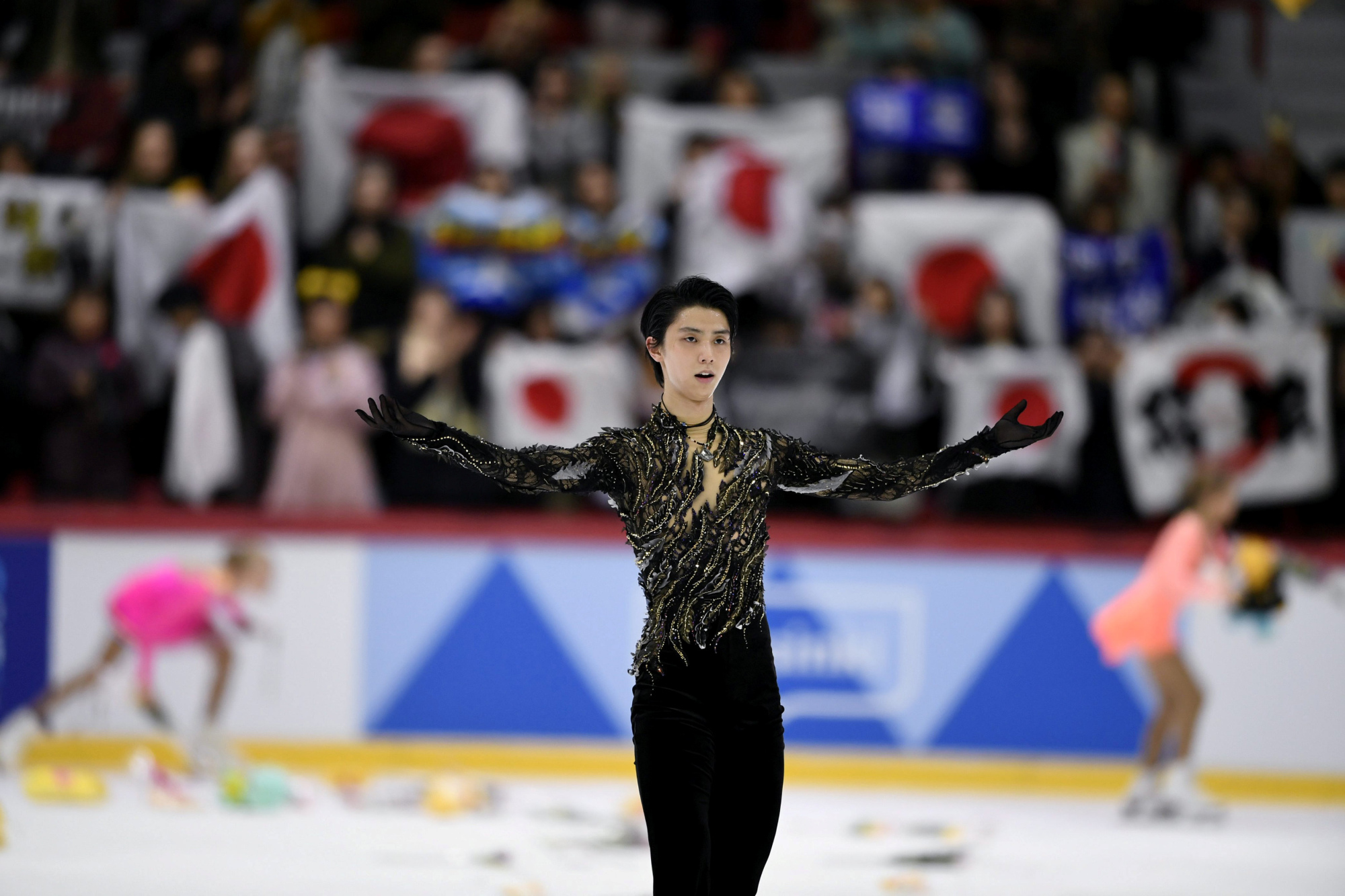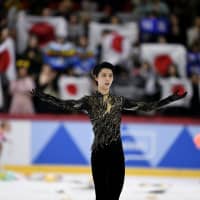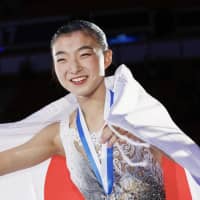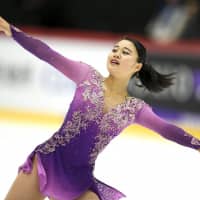Just when you didn't think he could go one better, he did.
Two-time Olympic champion Yuzuru Hanyu stunned the skating world again with his artistry and technical prowess on the way to a commanding victory at the Helsinki Grand Prix last weekend.
Hanyu set three world records in the process for highest short program (106.89), free skate (190.43) and total score (297.12) under the new +5/-5 GOE system. But it wasn't the numbers that resonated, it was the manner and passion with which he achieved them that did.
As if that wasn't enough, the Sendai native also threw in another historic first — a quad toe loop/triple axel combination. Never before landed in competition in the history of skating.
Lost in the glare of the records and the quad toe/triple axel was one more first. One that is almost hard to believe. The triumph marked the first time in Hanyu's nine years on the senior GP circuit that he has won his opening event.
"Actually I was fighting my condition, as it was not so good before I came here and after I came here," Hanyu was quoted as saying by the ISU website. "But I beat myself. Although the quad loop and quad toe were not perfect, I am pleased I was able to stay on my feet."
Michal Brezina of the Czech Republic came in second (257.98), nearly 40 points behind Hanyu.
Just as in the Sochi and Pyeongchang Olympics, the stage for the win was set by Hanyu's sublime short program. Skating to "Otonal," he began with a beautiful quad salchow, followed that with a nice triple axel, then hung on to the back end of his quad toe loop/triple toe loop combination jump.
He only received a level three on his step sequence, but it hardly mattered. The plaudits poured in from the experts afterward.
"Even by his standards, it was phenomenal," stated Eurosport's Simon Reed.
"One of his best ever. It is just utterly amazing," commented Reed's partner Mark Hanretty. "He's still come back and is not just sustaining his excellence, but improving his excellence."
Tara Lipinski and Johnny Weir, both Olympians themselves, were wowed by Hanyu's majestic performance.
"In this short program he was absolutely mesmerizing," Weir said on the NBC telecast.
"He is just one of those skaters I feel honored to watch," Lipinski remarked.
Lipinski and Weir were just getting warmed up for the main event — Hanyu's free skate to "Origin."
Though the superstar's opening quad loop and a quad toe loop were deemed under-rotated by the judges, Lipinski and Weir were floored by what they saw.
"There were so many beautiful delicate moments in that program. There was a strength to the choreography," Weir stated. "You could see that he believed in it so 100 percent."
As Weir analyzed a replay of Hanyu's free skate, he saw in it a lesson.
"First time ever, quad toe/triple axel sequence. Just brilliant," Weir remarked. "The fact that he is back again, not letting his level dip below what it was at the Olympic Games, it's so inspiring. All the young skaters out there should be looking at this and know that there is no end unless you decide it is the end."
Weir credits Hanyu's success in part to his ability to block out distractions.
"He completely disconnects himself from what is going on around him and only focuses on the skating," Weir noted.
Lipinski, the 1998 Olympic champion, was impressed by Hanyu's presence while performing.
"Watching him at center ice, where I think he is most natural, most comfortable, the joy that he brings to his fans," Lipinski said. "The aura and the presence that he brings to ice, it's unlike anyone else. I think he has had it for a long time. This is just who he is."
Lipinski admitted that Hanyu is one in a million.
"It's just rare to see this type of perfection in skating. Today wasn't absolutely perfect," Lipinski said. "But we talk about what he embodies. He is the entire package. He has the artistry, he has the technical ability, he has the performance ability, and he is able to withstand pressure."
Four-time world champion Kurt Browning and top analyst Carol Lane echoed the sentiments of their American counterparts on the CBC broadcast of the Helsinki GP.
"This guy is creating new expectations of the sport and longevity that I don't understand," Browning commented. "How can he do those quads for such a long period of time?"
"Maybe not just the best there is, but maybe the best there ever will be," Lane stated. "He's that good."
Sakamoto roars back
Kaori Sakamoto rebounded from a seventh-place showing in the short program to make the podium with a third-place finish and keep herself in the running for a spot in the Grand Prix Final.
Sakamoto uncharacteristically fell twice in her short program to "From My First Moment," going down on her opening triple flip and the back end of a triple loop/triple toe loop combo.
Fortunately the 18-year-old battled back in her free skate to "The Piano" and nearly finished second with a total of 197.42. Olympic champion Alina Zagitova won with 215.29, with her Russian compatriot Stanislava Konstantinova (197.57) taking second.
Sakamoto landed six clean triples and received level fours on her spins and step sequence in the free skate.
"She was great in Skate America. She was better here," Reed stated. "Of all the Japanese, I like watching her most."
Hanretty liked how Sakamoto bounced back from her poor short program.
"Such a brilliant performance. She was really distraught after the short program," Hanretty noted. "It looks like she and her coach have done the perfect job in assessing that disappointment and chaneling that into something quite brilliant."
Hanretty also saluted French choreographer Benoit Richaud for his work with Sakamoto.
"What she and her team have done in employing Benoit Richaud as a choreographer (for the free skate) has been genius. She is not the skater that Miyahara is. Miyahara is very elegant and balletic in her approach.
"Kaori isn't of that style, and so they picked quite abstract choreography," Hanretty continued. "A little bit more quirky, less elegant in its style, but it's perfect for her."
Shiraiwa just off podium
Yuna Shiraiwa (191.46) settled for fourth after being second in the short program. The good news is that her jumps looked better than they have in a long time.
Even though Shiraiwa was credited with three under-rotations in her free skate to "Pictures At An Exhibition," she did hit four triples, which have been a problem for her the past year.
Hanretty was moved by Shiraiwa's radiant smile.
"She has such a wonderful smile. She just beams in her smile," Hanretty said. "I think if we had a bit more of that in her actual program, the judges could give a bit more in the program component scores.
"For me, the composition of this program was much less in depth than that of her teammate Kaori Sakamoto. I would like to see that from a transitional standpoint and from a composition standpoint that this is not awarded quite as much as Sakamoto."
Hanretty noted how Shiraiwa has been impacted by her training partner.
"Shiraiwa trains with Satoko Miyahara and she is inspired and motivated by the diligence of Miyahara," Hanretty commented. "She is regarded as one of the hardest working in the ladies field. A good role model to have."
Takahashi victorious
Daisuke Takahashi's comeback continued with his victory at the Nishi-Nihon sectionals on Sunday evening. The 32-year-old held onto his lead after the short program to win with a total of 244.67. The result qualifies him for the Japan championships next month in Osaka.
His performance was significantly better than when he came in second at the Kinki regionals last month. Takahashi did not do any quads in his short program or free skate, but did land eight triples in the latter as he continues to work his way back into shape.
Kazuki Tomono, who was fifth at the worlds last season, was second with 233.00. One has to wonder if the younger skaters competing against Takahashi feel like they have gone to an open singing contest at a nightclub, only to find that Elvis Presley has come back to life and is one of their fellow contestants.
NHK Trophy up next
The GP moves to Hiroshima this week for the NHK Trophy starting on Friday.
Olympic and world silver medalist Shoma Uno leads the men's field, which includes compatriots Sota Yamamoto and Hiroaki Sato.
Uno's primary challengers should be American Vincent Zhou and Russia's Dmitri Aliev, who placed sixth and seventh, respectively in Pyeongchang.
Four-time national champion Miyahara tops the women's roster, which also has Mai Mihara and Rika Kihira in the lineup. The event will mark the senior GP debut for Kihira.
Miyahara will be challenged by former world champion Elizaveta Tuktamysheva, who won Skate Canada last month, and her compatriot Maria Sotskova.




















With your current subscription plan you can comment on stories. However, before writing your first comment, please create a display name in the Profile section of your subscriber account page.